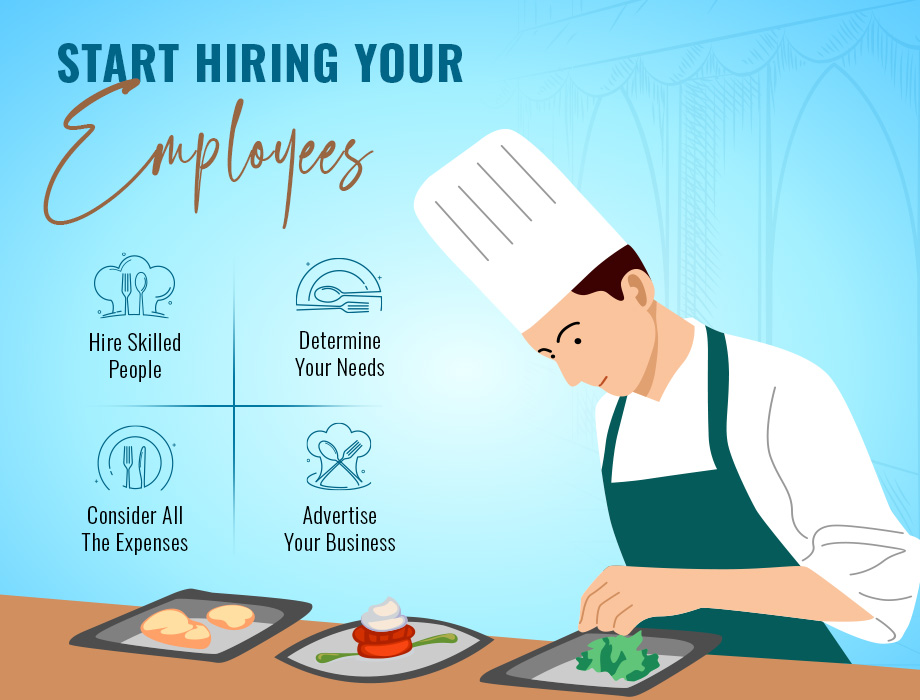How to Start a Food Business




Table of Contents
Table of Contents
“Quick summary” The food industry is a comprehensive network of operations that has undergone significant transformation throughout the years to meet the shifting demands of consumers.
If you have always wanted to work in the food sector but need help knowing where to begin, this blog is for you. We'll walk you through the essential preparations and real-world considerations for starting your own food company.
Every industry has particular challenges, and the food industry is no exception. But, regardless of challenges, it is booming right now and shows no signs of slowing down any time soon.
According to research, the food service sector is seeing rapid growth and is expected to reach $4.2 trillion with a 3.6% CAGR annually by 2024.
The impending boom is good news, but one of the most difficult aspects of launching a new food business is determining where to start. We've made this checklist to assist you in finding the resources you need to advance and start successfully.
Step-by-Step Guide: How to Start a Food Business
Embark on your entrepreneurial journey with our step-by-step guide on starting a food business. From concept development to licensing and marketing strategies, this comprehensive guide will navigate you through the essential stages, empowering you to successfully launch and grow your culinary venture. Explore the key ingredients for a thriving food business and turn your passion into a rewarding and delicious enterprise.
1. Make a Solid Business Plan
Creating a business plan is the initial and most crucial step in beginning a food business.

A food or restaurant business model should contain the following:
i. Type of Restaurant
Which of the following will you operate: a food truck, a full-service establishment, or a quick-service eatery?
ii. Determine Your Target Market
Before making a business plan, determining your target market and making the roadmap is crucial to get better results.
iii. Deciding on a Budget
To make informed decisions, you must create a detailed expenditure budget for inventory, labor, rent, and other expenditures.
iv. Identify Your USP
Discover what makes you stand out from the crowd. In these competitive times, having a distinctive selling point is critical for propelling your organization to new heights.
v. Food Menu
What foods, refreshments, or baked products will you serve, and at what rates will your meals be lucrative for your business and affordable for your customers?
To build a successful business strategy, you'll need to ask yourself several questions and also with the appropriate answers.
2. Secure Your Financing
Making financial decisions is one of the most important aspects of running your business. However, only some people who aspire to open a restaurant have the necessary personal resources. In actuality, the majority don't.

Fortunately, there are various ways to raise money for your new business:
- Obtain a business loan
- Rely on family and friends
- Find external investors or a partner
- Utilize crowdsourcing
- Obtain government assistance
Remember that it can be years before you start seeing profits and that money will be limited at first. Therefore, you must think about your financial status before making a choice. You can take baby steps and scale up later if funds are limited.
If you're considering having business partners, make a good decision because it will undoubtedly impact your company.
3. Choose Your Location
Choosing the ideal location for your business can be beneficial if you have a rough idea of the investment you could make in your food business. The choice of location is crucial to every new business' success.
Apart from having excellent infrastructure, first-rate customer service, and a wonderful environment, picking the right location is equally critical.

Before deciding on the site of your food business, there are a few things to consider.
i. Area
We don't recommend starting a business in a remote place because it requires extensive promotion. So carefully pick the best site.
ii. Space Size
Consider your research, target audience, budget, and other pertinent factors while deciding the size of the place.
iii. Target Market
Choosing the best location for your food business per your target market is also crucial.
iv. Affordability
Researching the area's rent or purchase price is also crucial. If you do, you may avoid paying higher rent or purchase prices, eventually making the items affordable for your customers.
4. Design the Layout of Your Space
You have chosen the best location and good work, which counts towards the most difficult tasks before starting a food business.
But the work doesn't end with choosing an ideal location. The most important part is decorating your outlet per your target market. In these times, where Genz & millennials are searching for Instagram-worthy restaurants, you need to make sure your restaurant or cafe stands out from the rest and makes a statement.
You need a place that draws the crowd's attention and is easily accessible.
On top of that, it must be within your budget.
The ambiance, the cutlery, the furniture, the menu, & everything else plays a significant role in the overall appearance of your business. So, consider everything and design accordingly.
5. Choose Your Suppliers
The selection of your company's suppliers is the next step. Your suppliers are the companies that guarantee you receive the quality goods and food you require to run your business.

i. The Things You'll Need
You will require furniture, Retail point-of-sale system, kitchen and restaurant machinery, ingredients, cutlery, and other items. You will consequently interact with a range of suppliers.
ii. Search at the Right Places
Try visiting wholesalers, your neighborhood farmer's market, searching local markets and asking other restaurant owners for advice, or just conducting a quick Google search.
iii. High-Quality & Affordable Range
Make sure the chosen provider has a good reputation and sells high-quality goods. Many vendors may offer you affordable costs and top-notch goods for your company.
iv. Do Your Homework
Do your research to find the best quality products at the lowest prices.
With increased consumer interest in sustainable businesses, where you get your food can also be a selling factor for your restaurant.
6. Get Your Licenses and Permits
The crucial step in setting up any company should always be getting government approval before launching a food business.

i. Business Registration
You must establish your business as a legal entity to run it effectively and comply with the law.
ii. Organization Name Registration
Registration of a business name is just as significant as incorporating a company. By registering your company's logo or trademark, you can accomplish this.
iii. Pollution Clearance
You must obtain a Pollution License/Certificate or permission from the Environmental Protection Agency to conduct a food business.
iv. Liquor License
A liquor license is required if you plan to sell alcohol.
v. Registration of Retail Establishments
If your shop employs more than 10 employees, you must enroll with the State Labor Department.
vi. Tax Registrations
You must complete your tax registration before starting your firm because it is mandatory.
7. Start Hiring Your Employees
To grow your food business, besides serving delicious meals, you also need to hire staff who can manage delivery tasks and ensure that the prepared food gets to the customer's plate.

i. Hire Skilled People
Maintaining the distribution procedure in your business is just as crucial as preserving the caliber of your meals. To solve this problem, finding reliable individuals who can assist you in achieving your objectives is essential to a business's success.
ii. Determine Your Needs
Your needs will determine who and how many employees you recruit. For instance, a food truck usually won't have a lot of employees, whereas a big restaurant will need more staff to keep the place running well.
iii. Consider All the Expenses
Hiring staff comes with benefits but includes huge expenses such as salary, PF, reimbursements, and other related things. So, consider everything and then jump to a conclusion.
iv. Advertise Your Business
One of the most crucial facets of operating a business is marketing. Connecting with your clients online and offline is crucial for attracting them.
- Online Marketing Tactics
- SEO (Search Engine Optimization).
- Using Social Media.
- Paid Advertising.
- Facebook Page Google Local Business Listing Email List.
- Local Company Listing.
- Website Marketing.
Considering the nature of your item, it's crucial to take your business to the streets and into the mouths of your prospective consumers through offline marketing methods as well:
- Offline Marketing Tactics
- Participate in farmers' markets to raise awareness locally.
- Partner with eateries or other similar businesses.
- Introducing your company at a global food and beverage exhibition.
- Give exciting discounts.
- Distribute flyers and pamphlets in the locality.
Conclusion
There you have it, then! Today, selling food is simpler than ever when you have the right roadmap and people. Now is the time to take the plunge into this cutthroat business environment, where food enterprises are becoming increasingly prevalent, and new ecommerce technology is always emerging.
While not entirely thorough, each of these elements is crucial as you prepare to launch your new food business.
You can establish many food enterprises, but the competition will be tough. Consider these 8 steps for beginning a food business to give you a head start for a food business.
So, make adjustments to the menu and prepare to feed the masses. Nothing is impossible if you put some effort into it and plan.